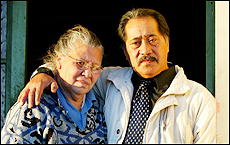|
Allegations
of Abuse in Institutions |
|
|
|
|
|
Now they are joining
the growing chorus of calls seeking a public inquiry into claims of serious
abuse at mental hospitals. Already nearly 200
former patients have lodged complaints with lawyers alleging mistreatment in
the 1960s and 1970s. The claims, which initially focused on Porirua Hospital,
have broadened to include most of New Zealand's former asylums, including
Oakley, Kingseat and Tokanui hospitals. The complainants are
separate from those of 95 former Lake Alice child patients who received a
$6.5 million Government payment and an apology in 2001 after claiming they
were tortured and sexually abused at the hospital in the 1970s. The most serious
allegations in the new claims are of sexual assault and beatings by staff and
patients. Like many of the
families seeking answers, the Kakes cannot understand why their son died so
suddenly. Yes, he was out of control, they say, but did the system fail him? Mr Kake was admitted to
Kingseat in 1989 after being diagnosed with a schizophrenic form of
psychosis. He was a severe asthmatic and prone to random acts of
uncontrollable violence. His parents, Tamiau and
Vaietu Kake, claim 23-year-old James was regularly beaten and abused at
Kingseat. They can produce no hard evidence of this, but say they regularly
saw bruising to his hands, face and neck. Because of Mr Kake's
medical condition and the fact that he needed to be close to a hospital in
case of a severe asthma attack, he was transferred to Stanford House in
Wanganui in 1996. His condition
deteriorated and on February 27, 1997, he reached breaking point. The events of that day
are still in dispute, but the official version is that Mr Kake had to be
physically restrained after refusing to take his medication. He was put in a secure
wing of the hospital, where he died of what, says the coroner, was an asthma
attack. The Kakes have spent
$12,000 challenging that finding, believing the amount of force used in restraining
their son led to the fatal attack. Police were unable to
find any evidence to back up the family's claim of manslaughter. Simativa Perese, the
lawyer representing the family, said excessive force and substandard nursing
care were the catalyst to Mr Kake's fatal attack, but that claim was not
supported by the coroner's findings. Mr Kake snr said if his
son's case helped to convince the Government to carry out a public inquiry
into the treatment of former patients, "then good". "This has been
going on too long. Like all these other families, we want someone held
accountable. That's the least we deserve." |

